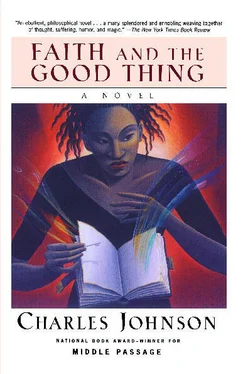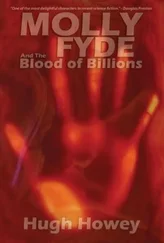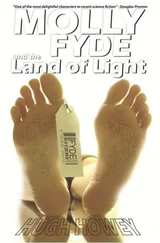“I’m going to get an usher,” he said. “I know those are our seats.” And he was gone, squeezing back out into the crowded, smoke-filled hallway. She waited, irritated by her full bladder, and afraid she’d miss Maxwell if she went searching for the women’s room. The billowing curtains before the stage below parted, and applause thundered around, below, and above her ears. A pianist appeared onstage, animated, his long fingers stroking the keys, his feet pumping the pedals, dark sunglasses flashing with floodlights directed his way and his head nodding with the melody now filling the auditorium. Faith exhaled nervously and pressed her thighs together. It would only take an instant to find the bathroom; she could be back before Maxwell returned with the usher. But she stayed, licking her dry lips and wringing her hands. She crossed her arms, then began to lose her fight with this sudden sense of dread that had no location, no cause; it broke free, not as she stood there pinching all her abdominal muscles together, but when she turned around and saw Maxwell returning with the usher, a six-foot bespectacled man wearing a blue uniform. He licked sleepily at his lips. She wanted to hide. It was Arnold Tippis.
“We’ll get this thing straightened out right now,” Maxwell said. He turned to the usher, but Tippis stopped cold in the aisle, tearing off his glasses and gawking at Faith.
“Where’ve you been hiding, girl?” Tippis cried. “You’ve got no idea what I’ve been going through trying to find you!”
She was going to wet her pants. She knew it. Faith glanced at Maxwell, already halfway down the aisle, then at Tippis, who was sliding toward her. People seated around them began to stare, scowl, and hiss like broken ventilators. She started to back away, but felt herself losing control.
Tippis placed his hand on her right arm and thrust his face near hers, saying, sotto voce, “I need somebody to talk to. You’ll listen, won’t you, Faith? I looked for you at the hotel, but Mrs. Beasley said you’d moved out a long time ago.” In the darkness of the theater she could hardly see his face.
“Please,” Faith said, “take your hand off.” Its pressure was upsetting her delicate equilibrium of tightened muscles, squeezing from her what she knew would be a very embarrassing deluge of. “Please. ”
“Things haven’t been right with me since I last saw you,” Tippis said. “There’s nobody to hear me out like you used to. Where are you staying? Faith, I’ve got to talk with you—”
Maxwell bounded back up the aisle and stopped, swaying at Faith’s side. “What’re you talking about?” He stared at Faith, his face blue, his chest heaving. “You don’t know him, do you?”
“Tell him, honey.” From Tippis. He put on his glasses and stared at Maxwell.
“No,” Faith whispered. She inhaled deeply, imagining her bladder to be as gravid, as swollen and distended as a womb. It was swelling up inside her like a tumor, was about to explode— boom! — and drown them all.
“No?” Tippis roared. He slipped his glasses on again. She could see the pain spring across his face, tightening his jaws and the muscles around his eyes and lips. Why couldn’t he go away before she had an accident? “Faith,” Tippis said, stumbling over his words, “you remember what we used to talk about — about how happiness and peace isn’t possible in society.” His face opened like a trapdoor. “But I was wrong ! God, it is possible. When I was with you and when you heard me out I felt something like genuine tranquillity. ” Tippis bobbed his head and his voice shot up. “I see that now! You do need other people to be whole, to discover who you are—”
All the while she said nothing, only held her stomach and groaned.
Tippis cried aloud, “Faith, this is Arnold !” and stepped back, slipping off his glasses again as if they concealed his face. “Look at me, please,” he said, touching his cheek. “You act like you don’t know me!”
Faith turned her head. Maxwell cocked his. Said: “What is this, anyway?”
“You weren’t this cold before,” Tippis said. His voice had an edge on it. “Maybe you don’t need the money, or me, or any body like you used to, but will you at least speak to me?”
Maxwell had had enough. He squeezed between them, his back to Faith, and his chin lifted. “She said she doesn’t know you, fellah,” poking his finger in Tippis’s chest.
“But she does!” Tippis laughed, short and uneasy, pulled at his blue collar, and squinted at Maxwell. “Girls don’t forget men that once made a difference in their lives, especially when—”
Then it began, the transformation of Isaac Maxwell. Before Tippis could complete his thought Maxwell slapped him — the sound like a shot, the force of it turning Tippis completely around. Maxwell looked at his stinging palm as though in a trance; he held it up to his face, fascinated, then stepped forward, smiling curiously, his legs stiff, and slapped Tippis again, exploring his sudden hatred, discovering himself through Tippis’s destruction.
“Isaac!” Faith shouted. But she could not move.
And Tippis took it passively, wind rushing out of him like a bellows when Maxwell drove his knee sharply into Tippis’s crotch — testing himself, moving from one insight to another. Faith screamed like a wild bird. She raked at Maxwell’s back, pulling away only pieces of yellow cloth as he showered the other with oaths and punches and pulled at his hair until a patch of bloody scalp came free in his hands. He turned, looked at Faith, and the valve to her bladder sprang open. Anger, children, had opened hallways in him, unlocked secret chests, and allowed him to chart in himself dark labyrinths that only the deep key of anger could disclose. So it was, children. So it often is. His eyes frightened her: wild, irascible, drunk, their vision inverted from the world to dark new dimensions Maxwell saw in himself. And enjoyed. The fight had been exhilarating; he’d heard every click, click, click of his confused life with clocklike deadliness during the fight, and felt — it was so obvious — truly whole for the first time, all the threads of his life converging and crystallizing at his moment of anger. But Tippis — his face was meat and blood. Below them, people looked up, and the musician stopped playing to stare.
Faith shouted again, “Isaac!”
The spell of this new side of himself — Maxwell the Berserker — held him fast. Physically lighter, his head clear and humming with a sudden sense of the efficacy of his Will, he did not hear her. Not even Faith might enter into and break the mood of that moment. She dragged him by his arm back down the stairs, the front of her dress and hosiery and underclothes soaking and clinging to her like skin. Once on the street, she stopped to support herself against a waste can, amazed that the air outside was quiet and still, that people passed them by without a single look, ignorant that her world had fallen into shambles.
She hurried Maxwell to the parking lot, and there he found his voice: “Did you see that sonuvabitch’s face? Did you see what I did to it?”
“I saw,” Faith said wearily.
She stopped to catch her breath beside his Buick, then slid behind the wheel, not trusting Maxwell, who shook and seemed too dazed to control the car. She was thankful he had taught her how to drive by letting her cruise around The Sentry parking lot occasionally. But she didn’t have a license. And she wasn’t about to give that a second thought. Faith took the keys in his outstretched hand, and minutes later they were tooling south down the Eisenhower Expressway.
“I’m sorry,” she said. “I haven’t the faintest idea who he was, really. Isaac. ” She looked at him shyly. Did he suspect? No, or at least it did not seem that way. His eyes were still narrowed, and he held his head in his hands, still swinging deep inside, still reliving that brief but perfect moment in the theater aisle.
Читать дальше












